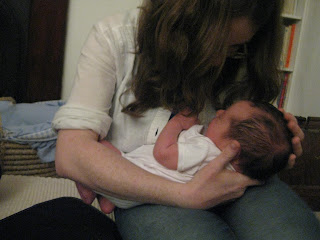Those loose council estate mums are bringing our country to ruin.
Lets exercise freedom in production not consumption
(where’s make love not war gone?)
It was yesterday’s news. The passing of new legislation which would make rights to child benefit income assessed. But more interesting is the debate it provoked. It’s sort of nice to think of the state as a protector and encourager of ‘universal (read national) rights’ and equal treatment, but we’re talking about money here, which always had comparative rather than universal value anyway. I can’t see equal opportunity being threatened in this particular case. Instead, this blog is about the comments made in relation to child benefit, its role, function and use. Notwithstanding the fact that I am no objective bystander in relation to reproduction and money (which few of us really are) and both issues have gained a novel importance to me recently because of the course of events in my own life, I was reminded of the highly righteous and moralistic attitude to the abortion debate when I read the old ‘socially concerned’, on various scales of the the left-right pointer, and otherwise professedly liberal, suggest that young, non graduates (which we can decide whether means ‘poorly educated’ in a more universalistic sense) who are supported by state benefits should wait, chose to refrain, restrain whatever you want to call it, before having children. Obviously, despite all the great strides made by feminists before we were all born, the damage both for aborting children and having them is blamed on the female sex. There hasn’t yet emerged a satisfactory male equivalent of ‘slag’ – with the same pointed repulsiveness, nonchalant irresponsibility, vindictive cunningness. If only more politicians were women. It’s far more poignant than ‘murderer’ or ‘terrorist’, which although they rightfully refer to the conscious decisions to shed the blood, are terms developed within a civil legal framework and hardly express the millions Bush and Blair caused the death or injury of, but never understood. Instead of the nomenclature awkwardly chanted in parrot-like fashion by disgruntled citizens in the attempt to voice and thus release some of their understandable disappointment, disdain and anger for their leaders, ‘slag’ expresses it all much more eloquently.
We often find in anthropological writings, the idea of peasants as less stringent in protecting the ‘honour’ of their daughters because less property is involved. And we ask automatically, isn’t that just because the traditions of the peasants are passed down more obscurely than those of the rich? Or that the record keepers themselves are less concerned with their plain of life?
The common snobbery one now finds amongst the ‘homogenised’ class of British literates, those with a concern, though more of a backstabbing and gossipy kind than conceptual interest , in the printed media as a carriage of the affairs of the shared ‘society’ is directed specifically against poorer people reproducing. Funny, given the aristocratic tendencies that run so bright throughout this, but strange when one identifies the fear inside it, of proliferation of the mob, an increase in social disorder, a lax in morals (though not in rationality- people don’t seem generally concerned with this- though artists sometimes comment on it), a hijack of the buoyant wealth of the nationally conceived state. This is all despite the fact that politics is much less nationally conceived than the media will have you think and that any business man can testify to the fact that the secret doings of our governors ignores any concept of the ‘nation’ in real terms.
The civil responsibility that is engendered so insipidly and ceremonially through the press is shouldered as real burden when it comes to sex. While public health, addiction, depression, theft are all seen as somehow private ills, why is reproduction is so social? A worthy discussion topic for all the population? If someone smokes brown and maybe robs an old person to perpetuate his habit, drinks or gorges himself on artificial, pre-prepared food into a static sense of loss of worth, these are individual ills. Answered, to some extent either by whining pressure groups socially remote themselves, or by a Christian sense of individual self redemption. The proliferator of ills must help himself.
But when it comes to having children, this is a sin you cannot own. Of course, in terms of being the trigger to a completely independent, self reasoning generation, I can see the need to socialise the issue. But aren’t the other issues that it is up against more than mere ‘personal choice’? Isn’t the maxim that we all change the world, but the challenge is to change it for the better, needed here? Even in all our homogenised employee-minded, consumerist mediocracy. Doesn’t it all stink too sourly of the old interference in a girl’s reproductive rights for the sake of pride, honour, ownership, perhaps framed also as her ‘spiritual salvation’?
To claim that any abstract idea of ‘society’ actually cares about the salvation of the individual is extremely optimistic, especially given their need to justify their arguments in social, economic, political terms. However, this is what ‘art’ tries to do, in attempting to make the problems of the individual the problems of society for the sake of those problems themselves.
We should retain the same respect for equality and freedom of choice in reproductive issues as we would in other issues. Like everything else, reproduction is inherently social, but the decision of whether or not to have children must also be viewed in its rightfully individualistic sense. Conceiving it too socially smells of the past’s tendency to coercively control and seems to drop all considerations of personal choice and ‘free will’ with relative immunity, though conceptually, these tenets are still held in such high esteem.
It seems that only when consumption is involved, by which I mean in, but not restricted to its commercial context, is ‘free will’ really championed. While the advocates of the freedom to smoke pot are not reducible to business interests and are genuinely motivated by a profound belief in individual choice and responsibility, they are arguing for their right to consume. And this is no doubt influenced by the inescapable commercial bombardment that we live under. Freedom to chose one’s sexual partner has even acquired a tottering place on the scale of socially acceptable protest, and yet the concepts of ‘love’ and ‘pleasure’ that it uses are accordingly consumerised. This is while one’s right not to or to have children regardless of one’s status, class, ethnicity or gender is still dragged from the realm of individual choice straight into the social sphere.
Does it all owe so much to Freud’s insistence that ‘our parents f--k us up’? And thus while our greedy pleasure seeking is permitable, we must adopt sobriety when it comes to reproduction? But of all the people to chose to justify our modern social battles, is Freud really the best recourse? (Answers welcome)
And aren’t there more commonly decided upon and threatening social ills than whether or not unborn embryos should live or die?


Comments
Post a Comment